Your Norton Security subscription might have expired pop-ups are a browser-based scam that uses social engineering methods to trick you and other users into believing that Norton Security subscription has expired and needs to be renewed. The pop-up requires immediate action as it reports that without renewing the Norton Security subscription, the computer will become susceptible to attacks of viruses and malware.
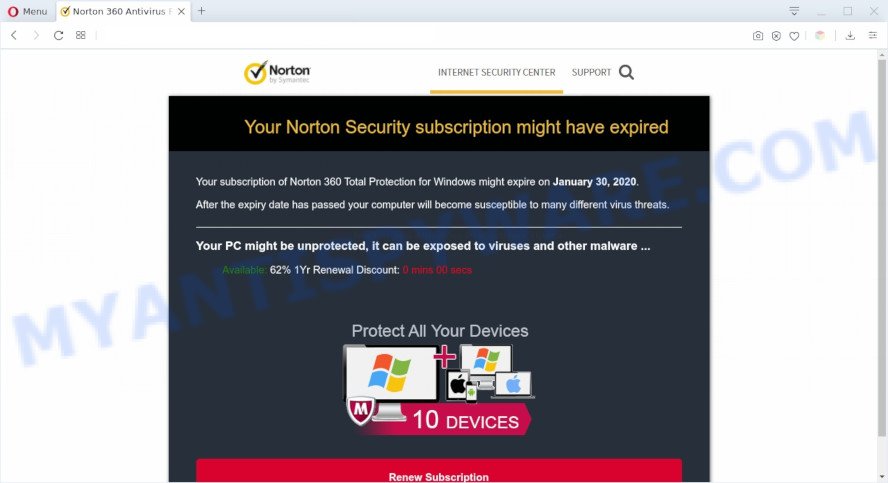
Text presented within this page:
Your Norton Security subscription might have expired
Your subscription of Norton 360 Total Protection for Windows might expire on January 30, 2020.After the expiry date has passed your computer will become susceptible to many different virus threats.
Your PC might be unprotected, it can be exposed to viruses and other malware …
Available: 62% 1Yr Renewal Discount: 0 mins 00 secsRenew Subscription
If you click on the ‘Renew Subscription’ button, your browser will be redirected to the legitimate Norton Security website, where you will be asked to buy the antivirus or renew your current subscription.
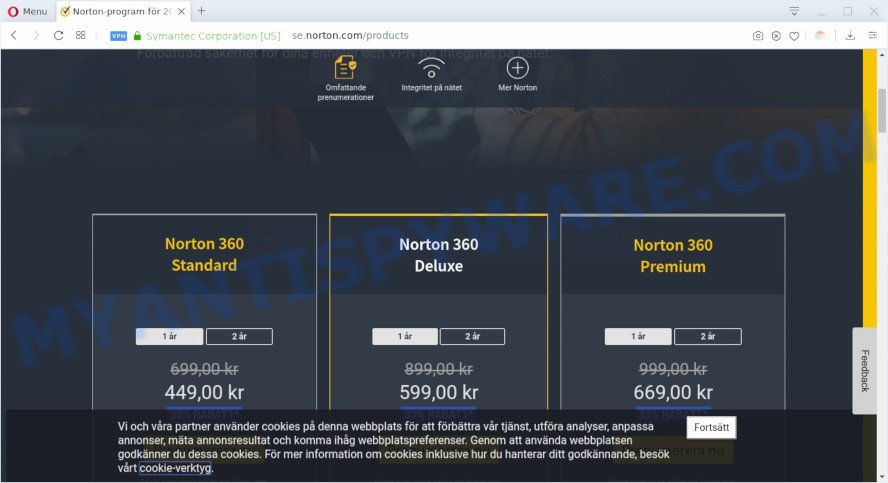
It does not matter if you use a standard antivirus (Windows Defender) or other antivirus software, in any case, when you click on the ‘Renew Subscription’ button you will be asked to buy or renew a Norton Security subscription. Although you are invited to buy or renew a legal antivirus subscription, the “Norton Security subscription might have expired” pop-up is a scam that you can safely ignore. Never believe what is written in this and similar messages. Very often, when you click on the suggested links or buttons, it may open a malicious website or download a file that is malware, adware or PUP (potentially unwanted program).
Where the “Your Norton Security subscription might have expired” pop-ups comes from
Some research has shown that users can be redirected to the “Your Norton Security subscription might have expired” scam from misleading advertisements, malicious websites or by PUPs and adware. Adware is something that developed in order to display third-party ads and deals to the user without asking his permission. Adware takes control of web-browsers and redirects them to unwanted web-pages like the “Norton Security subscription might have expired” scam every time you browse the Net. Adware can end up on your personal computer in various methods. In many cases is when you install free applications and forget to uncheck the box for the bundled apps installation.
Threat Summary
| Name | Your Norton Security subscription might have expired Scam |
| Type | Social Engineering, Phishing, Scam, pop ups, pop-up virus |
| Symptoms |
|
| Removal | “Your Norton Security subscription might have expired” pop-ups removal guide |
How does Adware get on your PC
Adware software may be spread through the use of trojan horses and other forms of malware, but most often, adware spreads bundled with some free programs. Many authors of free programs include optional apps in their install package. Sometimes it’s possible to avoid the installation of any adware: carefully read the Terms of Use and the Software license, select only Manual, Custom or Advanced setup method, disable all checkboxes before clicking Install or Next button while installing new free software.
So, obviously, you need to delete the adware as soon as possible. Use the free few simple steps below. This guide will help you clean your PC of adware and thereby get rid of the “Your Norton Security subscription might have expired” popup scam.
How to remove “Your Norton Security subscription might have expired” pop-up scam
There are a few ways which can be used to remove the “Your Norton Security subscription might have expired” scam. But, not all potentially unwanted programs and adware can be completely uninstalled utilizing only manual solutions. Most commonly you are not able to remove any adware utilizing standard MS Windows options. In order to remove “Your Norton Security subscription might have expired” popups you need complete a few manual steps and run reliable removal utilities. Most computer security professionals states that Zemana, MalwareBytes Anti-Malware (MBAM) or Hitman Pro utilities are a right choice. These free programs are able to scan for and remove “Your Norton Security subscription might have expired” pop-up scam from your computer and restore your internet browser settings to defaults.
To remove “Your Norton Security subscription might have expired”, perform the following steps:
- How to remove “Your Norton Security subscription might have expired” pop-up scam without any software
- Uninstall PUPs using MS Windows Control Panel
- Delete “Your Norton Security subscription might have expired” scam from Mozilla Firefox
- Remove “Your Norton Security subscription might have expired” pop ups from Chrome
- Get rid of “Your Norton Security subscription might have expired” popup scam from Internet Explorer
- How to automatically remove “Your Norton Security subscription might have expired” scam
- Automatically remove “Your Norton Security subscription might have expired” scam with Zemana Anti-Malware
- Remove “Your Norton Security subscription might have expired” scam from web browsers with Hitman Pro
- Run MalwareBytes Anti Malware to delete “Your Norton Security subscription might have expired” popup scam
- How to stop “Your Norton Security subscription might have expired” pop-up scam
- To sum up
How to remove “Your Norton Security subscription might have expired” pop-up scam without any software
The step-by-step guidance will help you manually delete “Your Norton Security subscription might have expired” pop-ups from the computer. If you are not good at computers, we advise that you use the free tools listed below.
Uninstall PUPs using MS Windows Control Panel
Check out the Microsoft Windows Control Panel (Programs and Features section) to see all installed applications. We suggest to click on the “Date Installed” in order to sort the list of apps by the date you installed them. If you see any unknown and suspicious programs, they are the ones you need to remove.
Windows 8, 8.1, 10
First, click the Windows button
Windows XP, Vista, 7
First, click “Start” and select “Control Panel”.
It will display the Windows Control Panel like below.
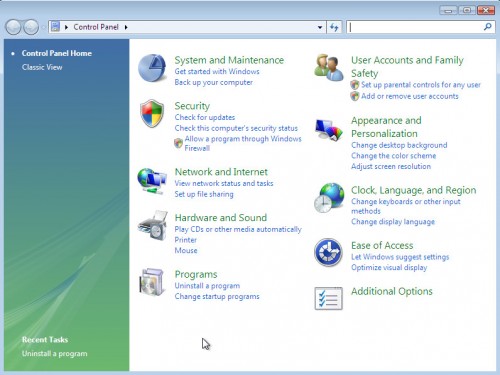
Next, click “Uninstall a program” ![]()
It will display a list of all apps installed on your machine. Scroll through the all list, and remove any dubious and unknown programs. To quickly find the latest installed apps, we recommend sort apps by date in the Control panel.
Delete “Your Norton Security subscription might have expired” scam from Mozilla Firefox
If Mozilla Firefox settings are hijacked by the adware, your web browser displays unwanted pop up ads, then ‘Reset Firefox’ could solve these problems. It’ll save your personal information like saved passwords, bookmarks, auto-fill data and open tabs.
Press the Menu button (looks like three horizontal lines), and click the blue Help icon located at the bottom of the drop down menu as displayed on the screen below.
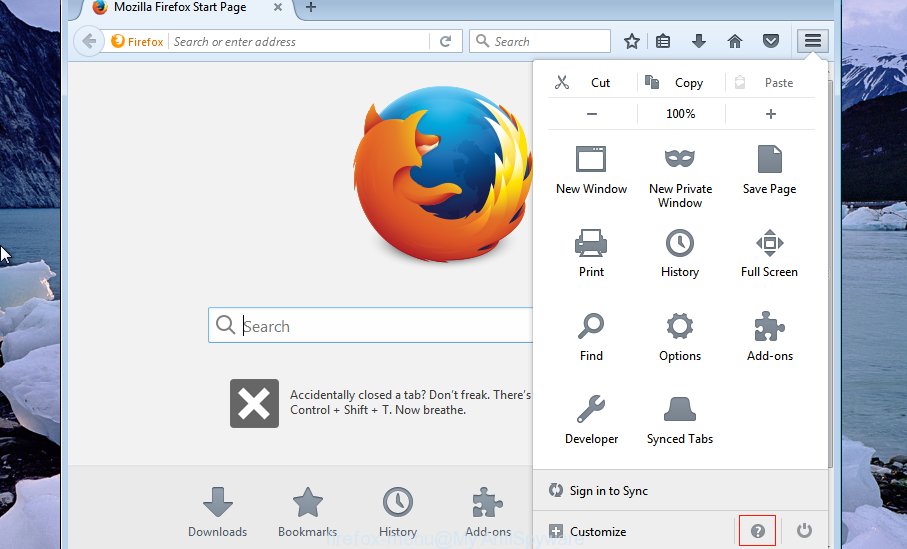
A small menu will appear, click the “Troubleshooting Information”. On this page, click “Refresh Firefox” button as shown on the image below.

Follow the onscreen procedure to revert back your Mozilla Firefox internet browser settings to their original settings.
Remove “Your Norton Security subscription might have expired” pop up scam from Chrome
Another solution to remove “Your Norton Security subscription might have expired” pop-ups from Chrome is Reset Chrome settings. This will disable harmful extensions and reset Chrome settings to original state. It will keep your personal information like browsing history, bookmarks, passwords and web form auto-fill data.
First run the Chrome. Next, click the button in the form of three horizontal dots (![]() ).
).
It will show the Google Chrome menu. Choose More Tools, then click Extensions. Carefully browse through the list of installed extensions. If the list has the extension signed with “Installed by enterprise policy” or “Installed by your administrator”, then complete the following instructions: Remove Google Chrome extensions installed by enterprise policy.
Open the Google Chrome menu once again. Further, click the option named “Settings”.
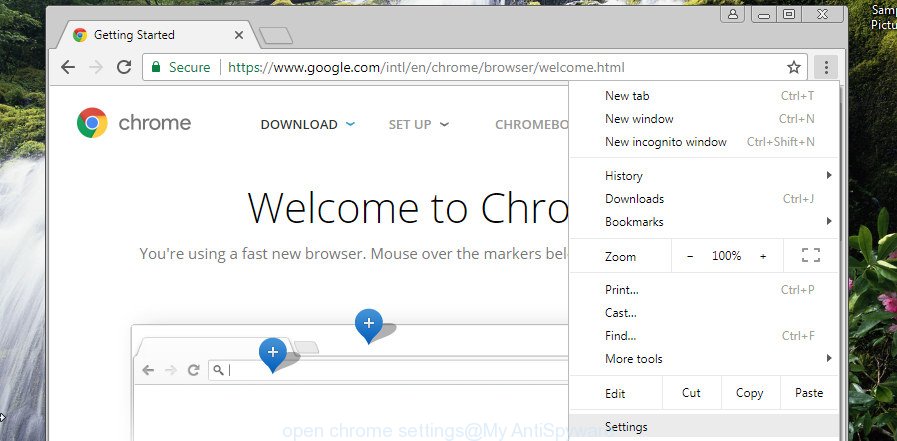
The web browser will display the settings screen. Another method to show the Chrome’s settings – type chrome://settings in the web browser adress bar and press Enter
Scroll down to the bottom of the page and click the “Advanced” link. Now scroll down until the “Reset” section is visible, as displayed below and press the “Reset settings to their original defaults” button.
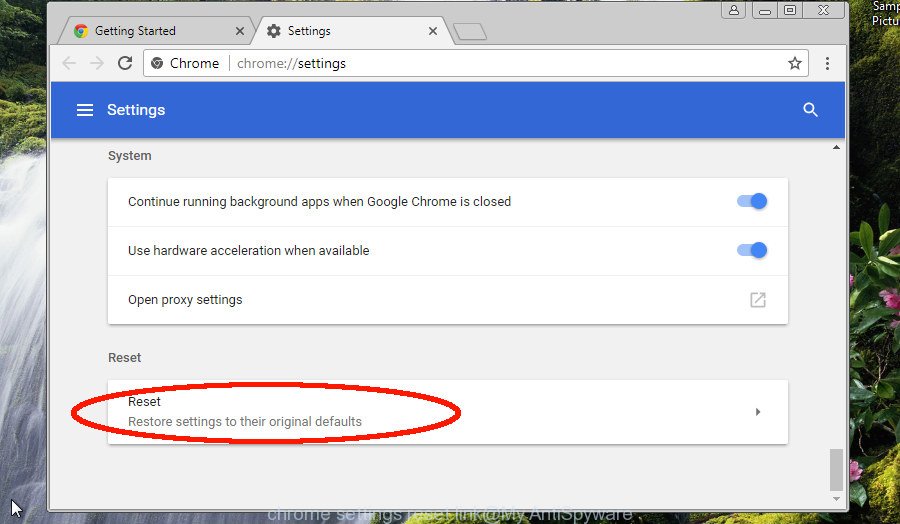
The Chrome will show the confirmation prompt as shown on the screen below.

You need to confirm your action, click the “Reset” button. The internet browser will start the process of cleaning. When it’s finished, the internet browser’s settings including search engine by default, newtab page and start page back to the values which have been when the Google Chrome was first installed on your system.
Get rid of “Your Norton Security subscription might have expired” popup scam from Internet Explorer
By resetting Internet Explorer web-browser you restore your internet browser settings to its default state. This is good initial when troubleshooting problems that might have been caused by adware.
First, launch the Microsoft Internet Explorer. Next, press the button in the form of gear (![]() ). It will show the Tools drop-down menu, press the “Internet Options” as displayed below.
). It will show the Tools drop-down menu, press the “Internet Options” as displayed below.

In the “Internet Options” window click on the Advanced tab, then click the Reset button. The Internet Explorer will show the “Reset Internet Explorer settings” window as displayed on the image below. Select the “Delete personal settings” check box, then click “Reset” button.

You will now need to restart your personal computer for the changes to take effect.
How to automatically remove “Your Norton Security subscription might have expired” scam
If you’re unsure how to get rid of “Your Norton Security subscription might have expired” pop-ups easily, consider using automatic adware software removal programs which listed below. It will identify the adware that causes “Your Norton Security subscription might have expired” scam in the web browser and delete it from your machine for free.
Automatically remove “Your Norton Security subscription might have expired” scam with Zemana Anti-Malware
Zemana is a free tool that performs a scan of your computer and displays if there are existing adware software, browser hijackers, viruses, worms, spyware, trojans and other malicious software residing on your machine. If malicious software is found, Zemana AntiMalware (ZAM) can automatically remove it. Zemana doesn’t conflict with other anti malware and antivirus software installed on your computer.
Now you can install and run Zemana to remove “Your Norton Security subscription might have expired” pop-ups from your internet browser by following the steps below:
Visit the page linked below to download Zemana installer named Zemana.AntiMalware.Setup on your computer. Save it on your Desktop.
165499 downloads
Author: Zemana Ltd
Category: Security tools
Update: July 16, 2019
Start the setup file after it has been downloaded successfully and then follow the prompts to setup this tool on your computer.
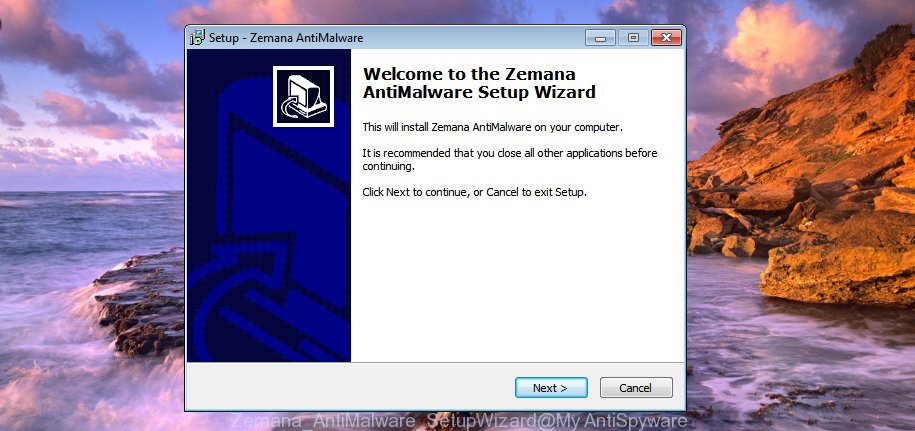
During installation you can change some settings, but we advise you do not make any changes to default settings.
When setup is done, this malware removal tool will automatically run and update itself. You will see its main window as shown on the image below.
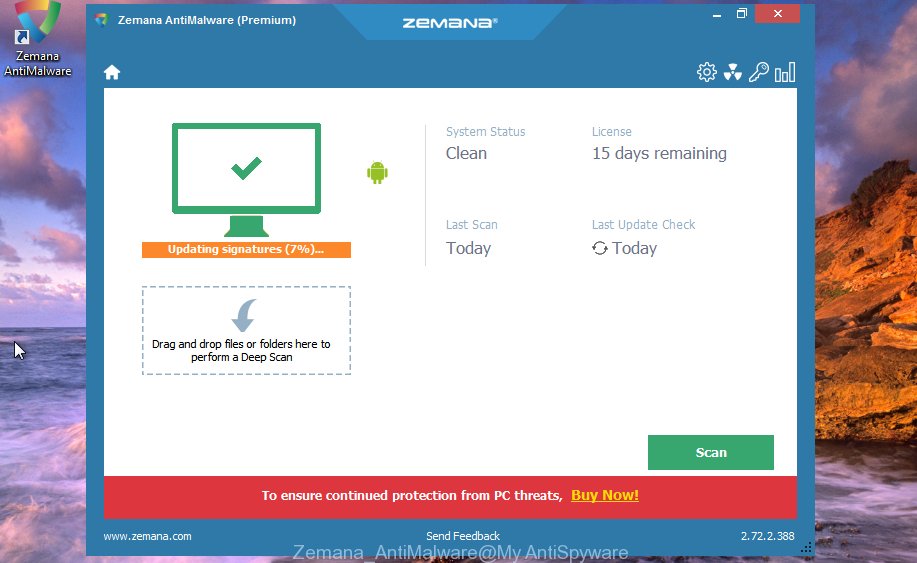
Now click the “Scan” button . Zemana application will scan through the whole PC system for the adware software which causes “Your Norton Security subscription might have expired” scam. A system scan may take anywhere from 5 to 30 minutes, depending on your machine. When a malware, adware software or potentially unwanted applications are found, the number of the security threats will change accordingly.

When Zemana Anti-Malware has completed scanning your machine, it will show the Scan Results. All detected items will be marked. You can remove them all by simply click “Next” button.
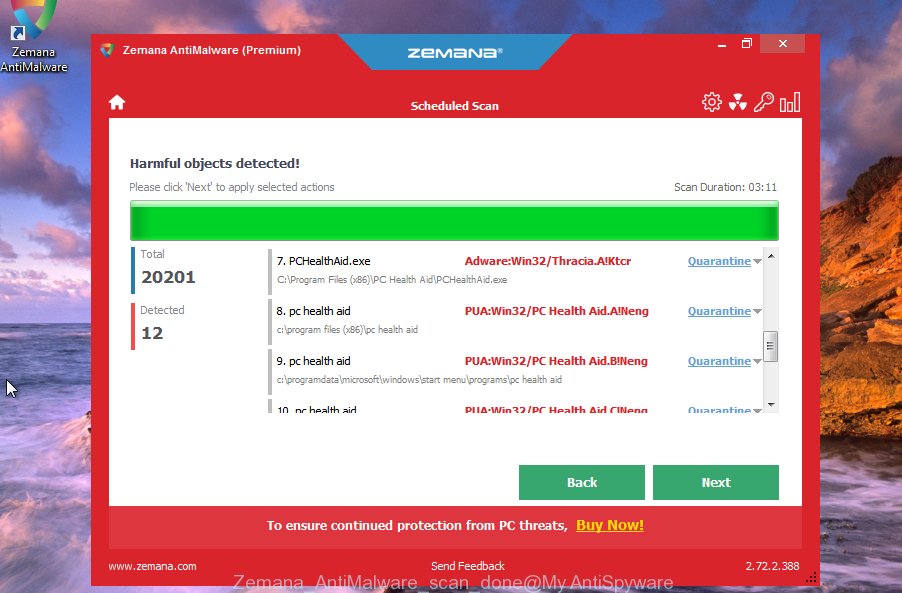
The Zemana Free will delete adware related to the “Your Norton Security subscription might have expired” pop-ups and move the detected security threats to the program’s quarantine. After disinfection is complete, you can be prompted to reboot your personal computer to make the change take effect.
Remove “Your Norton Security subscription might have expired” scam from web browsers with Hitman Pro
If the “Your Norton Security subscription might have expired” pop-ups issue persists, use the Hitman Pro and scan if your computer is infected by adware. The HitmanPro is a downloadable security utility that provides on-demand scanning and helps get rid of adware, PUPs, and other malicious software. It works with your existing anti-virus.
Installing the HitmanPro is simple. First you will need to download Hitman Pro from the following link. Save it directly to your MS Windows Desktop.
After downloading is complete, open the file location and double-click the HitmanPro icon. It will run the HitmanPro tool. If the User Account Control prompt will ask you want to open the program, click Yes button to continue.

Next, click “Next” for checking your PC for the adware software that causes “Your Norton Security subscription might have expired” pop-ups. This task may take quite a while, so please be patient. While the utility is scanning, you may see how many objects and files has already scanned.
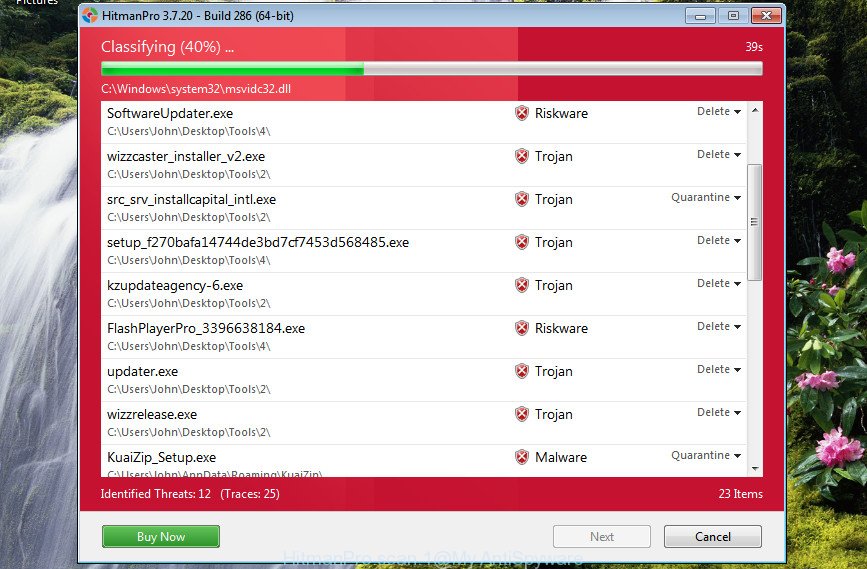
As the scanning ends, it will display the Scan Results as displayed in the figure below.
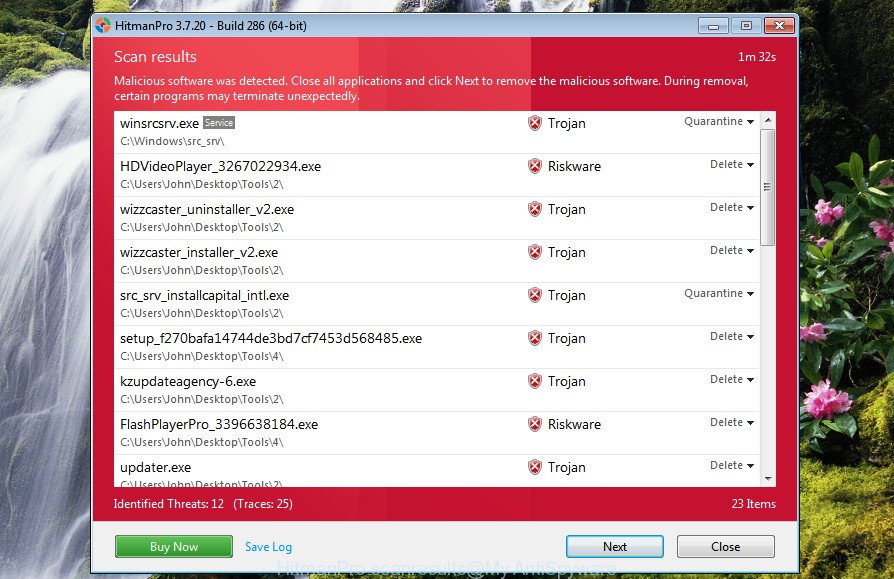
Review the results once the utility has done the system scan. If you think an entry should not be quarantined, then uncheck it. Otherwise, simply press “Next” button. It will show a prompt, click the “Activate free license” button. The Hitman Pro will remove adware software related to the “Your Norton Security subscription might have expired” scam. When finished, the tool may ask you to restart your machine.
Run MalwareBytes Anti Malware to delete “Your Norton Security subscription might have expired” popup scam
We suggest using the MalwareBytes. You can download and install MalwareBytes Anti-Malware (MBAM) to locate adware and thereby remove “Your Norton Security subscription might have expired” scam from the computer. When installed and updated, this free malicious software remover automatically finds and removes all threats present on the computer.
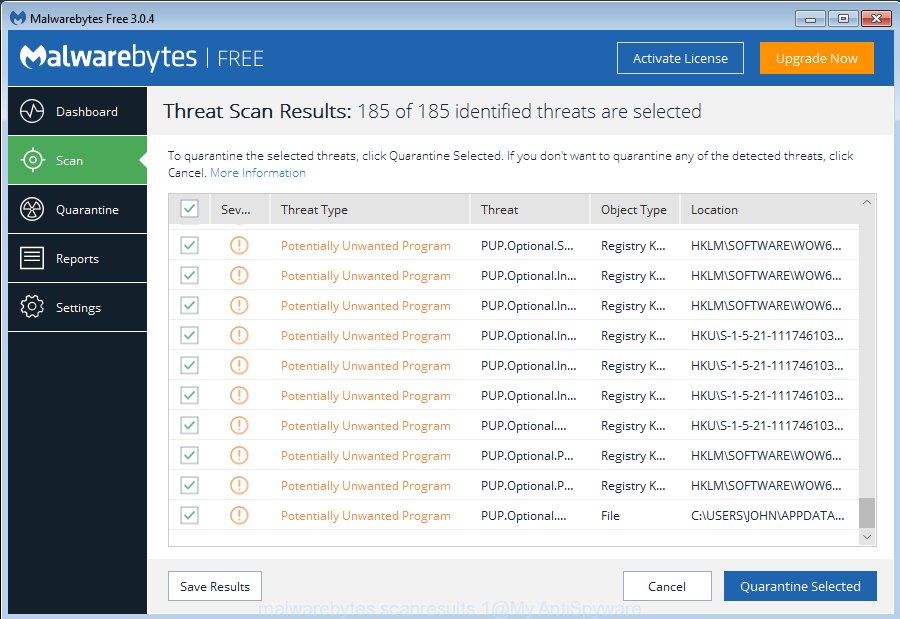
- MalwareBytes AntiMalware can be downloaded from the following link. Save it on your Desktop.
Malwarebytes Anti-malware
327717 downloads
Author: Malwarebytes
Category: Security tools
Update: April 15, 2020
- At the download page, click on the Download button. Your internet browser will show the “Save as” prompt. Please save it onto your Windows desktop.
- Once downloading is finished, please close all applications and open windows on your system. Double-click on the icon that’s named mb3-setup.
- This will launch the “Setup wizard” of MalwareBytes onto your PC. Follow the prompts and do not make any changes to default settings.
- When the Setup wizard has finished installing, the MalwareBytes Free will run and open the main window.
- Further, click the “Scan Now” button . MalwareBytes Anti-Malware (MBAM) program will scan through the whole system for the adware software that causes multiple unwanted pop-ups. Depending on your computer, the scan can take anywhere from a few minutes to close to an hour. While the MalwareBytes Anti-Malware (MBAM) application is scanning, you can see how many objects it has identified as threat.
- Once finished, it will display the Scan Results.
- In order to remove all security threats, simply click the “Quarantine Selected” button. Once that process is finished, you may be prompted to restart the PC.
- Close the Anti-Malware and continue with the next step.
Video instruction, which reveals in detail the steps above.
How to stop “Your Norton Security subscription might have expired” pop-up scam
It is important to run ad blocking software like AdGuard to protect your PC system from harmful web sites. Most security experts says that it’s okay to block ads. You should do so just to stay safe! And, of course, the AdGuard can to block “Your Norton Security subscription might have expired” scam and other misleading web-pages.
Click the link below to download the latest version of AdGuard for Microsoft Windows. Save it on your Desktop.
27035 downloads
Version: 6.4
Author: © Adguard
Category: Security tools
Update: November 15, 2018
After downloading it, run the downloaded file. You will see the “Setup Wizard” screen like below.
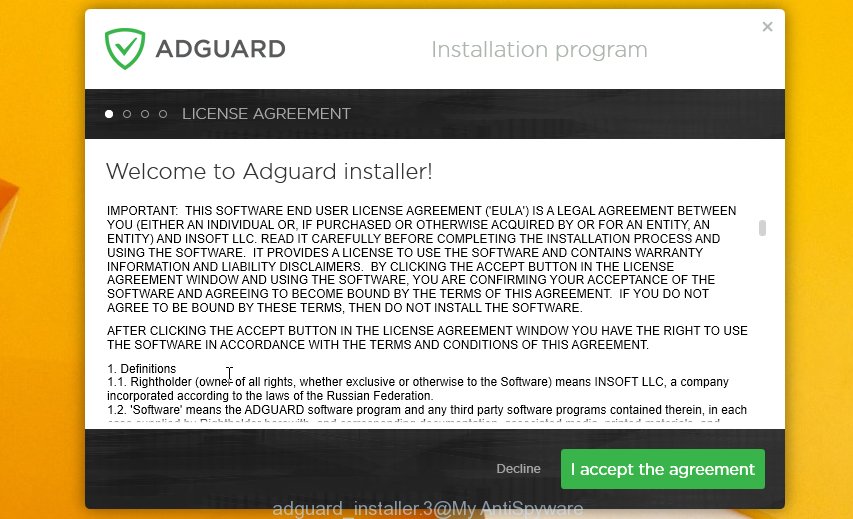
Follow the prompts. Once the setup is finished, you will see a window like below.

You can click “Skip” to close the installation program and use the default settings, or press “Get Started” button to see an quick tutorial which will assist you get to know AdGuard better.
In most cases, the default settings are enough and you don’t need to change anything. Each time, when you run your PC system, AdGuard will run automatically and stop unwanted ads, block “Your Norton Security subscription might have expired” scam, as well as other harmful or misleading web pages. For an overview of all the features of the program, or to change its settings you can simply double-click on the AdGuard icon, that is located on your desktop.
To sum up
After completing the step-by-step instructions above, your machine should be clean from the adware and other malware. The Microsoft Edge, Google Chrome, IE and Firefox will no longer display the “Your Norton Security subscription might have expired” pop-ups when you browse the Web. Unfortunately, if the step-by-step instructions does not help you, then you have caught a new adware, and then the best way – ask for help.
Please create a new question by using the “Ask Question” button in the Questions and Answers. Try to give us some details about your problems, so we can try to help you more accurately. Wait for one of our trained “Security Team” or Site Administrator to provide you with knowledgeable assistance tailored to your problem with the “Your Norton Security subscription might have expired” pop-up scam.


















